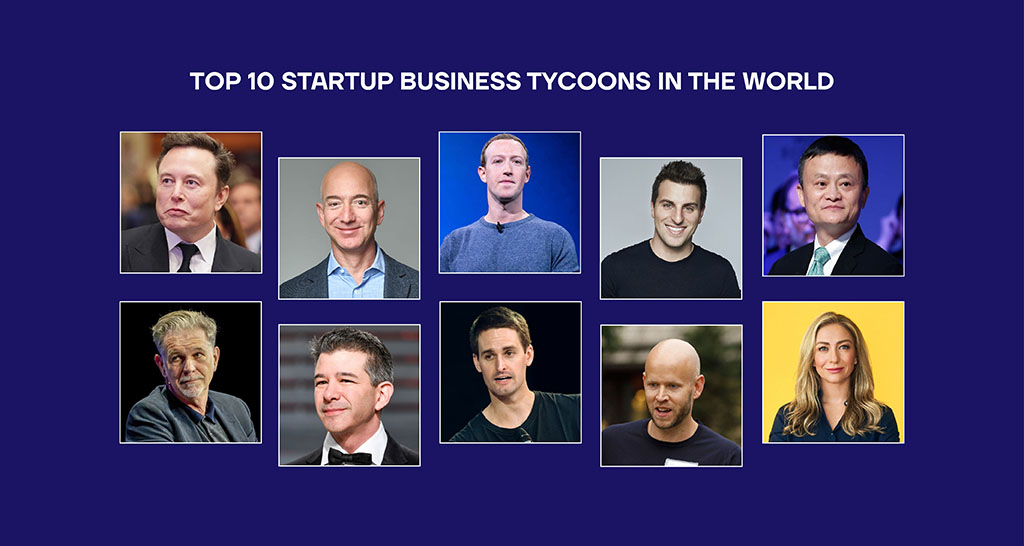- Bill Gates
Bill Gates was born in 1955, went to Lakeside prep school, and left Harvard to start Microsoft. He is an American billionaire known for co-founding Microsoft and being a prominent business figure, philanthropist, and advocate. He was crucial in the microcomputer revolution and co-founded Microsoft with Paul Allen. He guided Microsoft’s growth and created the MS-DOS operating system. Despite his success, he faced criticism while doing business.
Gates and Allen skillfully secured a deal with MITS for the Altair BASIC software. They officially founded Microsoft in 1976. Gates expanded the company, made a significant deal with IBM for PC DOS, and shifted to philanthropy in 2000 through the Bill & Melinda Gates Foundation. He supports global health, education, and climate change. Gates co-founded The Giving Pledge and backed clean energy projects.
Gates’ image changed from a tech leader to a philanthropic icon. Gates continues to influence technology, business, and philanthropy significantly, remaining important in these areas despite challenges and evolving public opinions.
- Warren Buffet
Warren Buffett showed an early interest in business, which prompted him to buy stocks at 11 and invest in his father’s ventures during high school. He attended the University of Nebraska and graduated at 19. Further education at Columbia Business School improved his investment strategy. Buffett started his investment with the Buffett Partnership in 1956, then skillfully expanded Berkshire Hathaway into a diverse company.
Billionaire Buffett co-founded The Giving Pledge, embracing philanthropy and thrifty habits. He diversified investments, wrote about economics, and adapted well. He cautioned against inflation, questioned markets, and liked index funds. He criticized banks, praised index funds and practical expectations, and was known for smart investments, philanthropy, and strategy.
He started donating to the Gates Foundation and got awards. He criticized gold, handled ventures, and cared about society. He urged honest corporate reporting and approached cryptocurrencies carefully. Buffett’s legacy includes charity, smart investing, and ethics, showcased through his writing, media presence, and ongoing charitable work. His lasting impact shapes charity and investing norms. His ability to change, his focus on helping others, his smart investing ideas, and his sense of ethics to create a strong and long-lasting mark.
- Mark Zuckerberg
Mark Zuckerberg is a famous American entrepreneur, programmer, and philanthropist. He co-founded Facebook while in college and made it famous. Meta Platforms now look after the company.
In 2004, Zuckerberg started a website called Facebook with his friends. He got the idea from his school’s directory. Originally, Facebook was only for the students of Harvard University, but then Zuckerberg and his friend expanded it. Zuckerberg left Harvard to work on his project with co-founders in California. Zuckerberg wanted young people on his team and aimed to make the world open. Zuckerberg became famous for his innovation and influence. He learned from Steve Jobs about creating good things. In short, Zuckerberg left Harvard, made Facebook, valued openness, and aimed to do good.
Under his leadership, it became over a billion users by 2012 and became a public company that year, making him the youngest self-made billionaire. He’s engaged in Internet access, philanthropy, and innovative projects like Breakthrough Starshot. While the movie The Social Network portrays his life, some details need to be more accurate. With his spouse Priscilla Chan, Zuckerberg founded the Chan Zuckerberg Initiative in 2015, aiming for positive changes in education, healthcare, research, and technology. Their wealth supports this initiative through a pledge to donate 99% of their Facebook shares for societal betterment.
He donated during the Ebola and COVID-19 pandemics to help during the overwhelming crises. In 2022, Zuckerberg started training in Mixed Martial Arts and Brazilian Jiu-Jitsu. He enjoys these sports. In May 2023, he won medals in a Jiu-Jitsu tournament. In July 2023, he got a blue belt in Brazilian Jiu-Jitsu.
- Elon Musk
Elon Musk comes from a wealthy family with British and Pennsylvania Dutch roots. Despite being shy in school, he loved computers and games. He learned programming independently, making a game called Blastar at twelve and selling it for $500. After attending various schools in South Africa and briefly studying at the University of Pretoria, Elon Musk moved to the US. His early life was shaped by his family, interest in technology, and education before he entered the tech industry.
In 1989, Elon Musk moved to Canada, attended universities in Ontario and Pennsylvania, and co-founded Zip2 in 1995. Later, he was part of the co-founding of X.com, which merged with PayPal.In 2002, Musk founded SpaceX using his own money. SpaceX succeeded with rocket launches despite initial difficulties, even reaching the ISS. He’s known for his involvement in multiple companies, wealth, and contributions to electric cars, space, and AI.
Elon Musk’s SpaceX did impressive things, like landing rockets on ships, sending a Tesla car into space with the Falcon Heavy rocket, and making a reusable Starship. SpaceX’s Demo-2 mission was a significant achievement, sending astronauts to the ISS, a first for a private company. Musk wanted to improve space technology and travel cheaper, resulting in essential successes in the industry.
- Azim Premji
Azim Hashim Premji was born in 1945; he is a prominent Indian businessman and philanthropist. He studied Electrical Engineering at Stanford University. He was in charge of Wipro Limited and helped it become a top software company worldwide. Realizing the potential of IT, he shifted Wipro’s focus to software from manufacturing, leading to remarkable success. He donated over half his wealth to Indian education through the Giving Pledge, starting with $2.2 billion for the Azim Premji Foundation. His father’s decision to stay in India, despite an offer from Muhammad Ali Jinnah, shows their family values.
Business Week called him a great entrepreneur. He got special doctorates and prestigious awards in India: Padma Bhushan and Padma Vibhushan. Time magazine listed him in the influential list, and France gave him the Chevalier de la Legion d’Honneur award.
Forbes praised his extensive charity work, calling him a Hero of Philanthropy. He started the Azim Premji Foundation in 2001 and has donated more than $21 billion to support education, COVID-19 initiatives, and other purposes. Even though he gave a lot to charity, his position on the Forbes India Rich list fell in 2019. His influence, sharing, and dedication make him essential in business and charity.
- Mukesh Ambani
Born in 1957, Mukesh Ambani is a prominent Indian billionaire leading Reliance Industries, a top Indian company. His significant wealth and achievements are well-recognized, though subject to discussions. After studying in India and briefly, at Stanford University, he joined Reliance Industries in 1981, later expanding its reach into sectors like refining, petrochemicals, retail, and telecom, notably through Reliance Retail Ltd. and Jio. In the 1980s, he was crucial in securing a polyester manufacturing license.
Mukesh Ambani is famous for his vast wealth and influence, consistently ranking on Forbes’ list of India’s richest. He owns teams in sports leagues like the Indian Premier League and Indian Super League. Amid family changes, he played a key role in building a massive oil refinery and launched Reliance Jio Infocomm (Jio) in 2016, becoming a major player in India’s telecom industry. Ambani’s leadership led to innovations like Jio’s 4G phones and super-fast 5G internet in 2022. Despite challenges, he showed resilience.
His story reflects hard work, strength, and significant contributions to Reliance Industries, shaping India’s business and tech landscape. He had important roles in different organizations. He was on the Board of Governors at the Institute of Chemical Technology. At Reliance Industries Limited, he was a Chairman and Managing Director, managing important teams in petroleum and retail. He also worked in banking at Bank of America Corporation. He also contributed to education as the President of Pandit Deendayal Petroleum University in Gujarat.
- Francoise Bettencourt Meyers
Francoise Bettencourt Meyers, born on July 10, 1953, is a French businesswoman, philanthropist, writer, and billionaire. Her mother and grandfather founded L’Oreal. After her mother’s demise in 2017, her wealth grew through investments and the valuable shares of L’Oreal. In the same year, she had substantial wealth and ranked among the world’s wealthiest individuals. As per Forbes, In March 2022, she earned the world’s richest woman award.
Likewise, in 2022, according to the Bloomberg Billionaires Index, she was recognized as the world’s richest woman. Following a fire at Notre Dame de Paris, she and L’Oreal donated to support its restoration.
- Steve Jobs
Steve Jobs, an American innovator, entrepreneur, and businessman, was also known for his inventive contributions. Steve Jobs was a smart entrepreneur who started Apple and changed technology. At Apple, he played a role in developing both a computer and a video game. Jobs’ journey led to his important work at Apple, making people everywhere think in new ways and create new things.
Steve Jobs, drawn to electronics and arts, learned from engineers during his youth. He co-founded Apple in 1976 with his friend Wozniak, creating significant computers like Apple II and Macintosh. Starting in a garage, Apple sold computers and introduced the Macintosh in 1984. Jobs left in 1985 and founded NeXT and Pixar in 1986. Apple rehired him as CEO in 1996 after buying NeXT. He crafted iconic devices like iMac, iPod, iTunes, and iPhone, while Zen and Buddhism inspired his designs. He valued details, worked with Joanna Hoffman during illness, and kept his charity private. Questions emerged about Apple’s giving. He donated to Stanford, supported AIDS initiatives, and reportedly assisted Africa in fighting AIDS.
- Richard Branson
Sir Richard Branson was born in England. He’s a very successful business person and commercial astronaut. He founded Virgin Group, which has more than 400 different companies across diverse sectors. He began with a magazine and record business and then made Virgin Atlantic airline. He expanded into various industries with Virgin Galactic, including telecommunications, railways, and space tourism.
In 2023, Branson’s net worth is around $3 billion. He ventured into space at 70 in 2021, becoming the third oldest person to do so. Despite facing learning challenges like dyslexia and ADHD, his parents provided support. He established numerous successful businesses, co-founding The Elders to address global conflicts and engaging in philanthropy for causes like child protection and the environment. His diverse career spans achievements like Virgin Records, Virgin Atlantic, railways, airlines, Virgin Mobile, and Virgin Hotels, along with investments in Formula One, drone company 3D Robotics, and Hyperloop One.
He advocates against the death penalty and has supported individuals who are in trouble. Branson cares about things like saving the Earth and helping people. He did a concert to raise money for Venezuela. He’s good at many things, like business and helping others, and he’s known worldwide.
- Michael Bloomberg
Michael Bloomberg was born in 1942. He is an American co-founder of Bloomberg L.P., a notable financial company recognized for its Bloomberg Terminal. He earned an engineering degree from Johns Hopkins University and an MBA from Harvard Business School. Bloomberg is known for his philanthropy, focusing on education, infrastructure, and environmental issues.
He co-founded Innovative Market Systems (IMS) in 1981. He developed the Market Master terminal for real-time finance data. IMS later became Bloomberg L.P., offering Bloomberg News. Over time, it earned significant revenue and served many terminal subscribers. He took a break to be NYC’s mayor, returned in 2014, ran for president in 2019, and stepped down as CEO. His wealth greatly increased, making him one of the richest. Bloomberg has a broad impact on business and charity in various fields.
Michael Bloomberg’s journey began in finance at Salomon Brothers before establishing Bloomberg L.P., a financial data and media leader. He pledged to donate a significant portion of his wealth through The Giving Pledge, supporting health, arts, innovation, environment, and education. He helped during COVID-19 with research and aid. He likes the environment and makes clean energy important. He started the Risky Business project about climate change’s risks. He generously supported Johns Hopkins for education and helped students in need by donating some amount. He cares about tobacco control and gun safety, making major donations and starting Everytown for Gun Safety. He helps with city ideas, culture, and teamwork, making a big impact on global problems.








